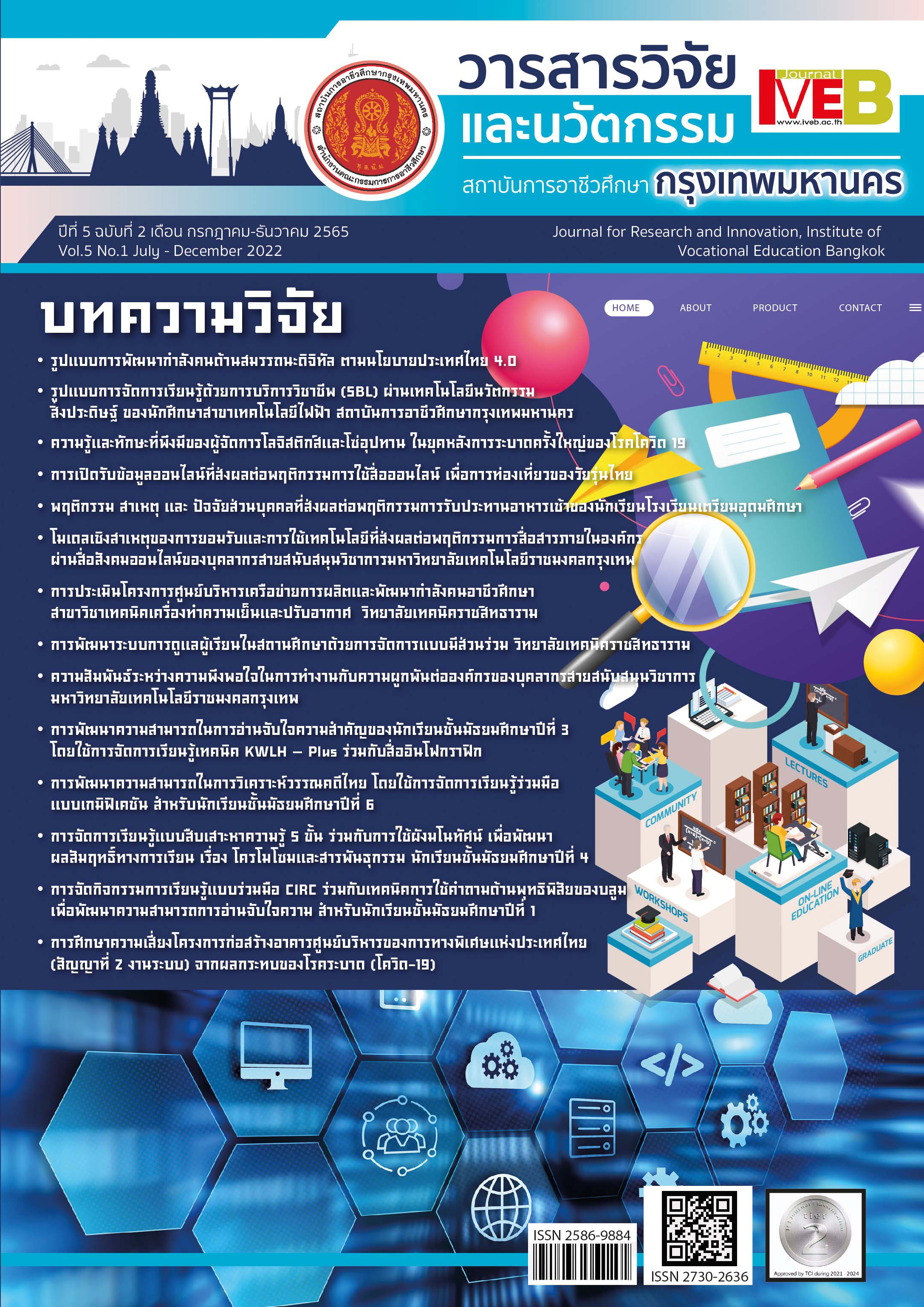ความรู้และทักษะที่พึงมีของผู้จัดการโลจิสติกส์และโซ่อุปทานในยุคหลังการระบาดครั้งใหญ่ของโรคโควิด 19 Knowledge and Skills Required of Logistics and Supply Chain Manager in the Post Pandemic Covid 19 Era
Main Article Content
บทคัดย่อ
ในปัจจุบัน ธุรกิจมีการดำเนินงานในสภาพแวดล้อมที่มีความผันผวน โดยเฉพาะอย่างยิ่ง เมื่อโลกต้องเผชิญกับภาวะการระบาดครั้งใหญ่ของโรคโควิด 19 งานวิจัยนี้ จึงมีวัตถุประสงค์เพื่อ 1) นำเสนอกรอบแนวคิดเกี่ยวกับความรู้และทักษะที่พึงมีของผู้จัดการโลจิสติกส์และโซ่อุปทานที่ปรับปรุงใหม่ให้เหมาะกับสภาพแวดล้อมที่เปลี่ยนไป 2) ศึกษาระดับความสำคัญของความรู้และทักษะที่พึงมีของผู้จัดการโลจิสติกส์และโซ่อุปทาน 3) ทดสอบระดับความสำคัญของกลุ่มความรู้และทักษะที่พึงมีของผู้จัดการโลจิสติกส์และโซ่อุปทานในด้านธุรกิจ ด้านโลจิสติกส์และโซ่อุปทาน และด้านการจัดการ ว่าแตกต่างกันหรือไม่ 4) ทดสอบระดับความสำคัญของความรู้และทักษะที่พึงมีของผู้จัดการโลจิสติกส์และโซ่อุปทานในแต่ละอุตสาหกรรมว่าแตกต่างกันหรือไม่ งานวิจัยฉบับนี้เก็บข้อมูลจากธุรกิจผู้ให้บริการด้านโลจิสติกส์ ที่มีรายได้มากกว่า 100 ล้านบาทต่อปี โดยการส่งแบบสอบถามทางไปรษณีย์ จำนวน 655 ชุด ได้รับการตอบกลับ 111 ชุด งานวิจัยฉบับนี้ พบว่า ผู้ให้บริการใน 3 อุตสาหกรรมให้ความสำคัญกับความรู้และทักษะเกือบทุกรายการไม่แตกต่างที่ระดับนัยสำคัญ 0.05 แต่อย่างไรก็ตาม เมื่อเปรียบระดับความสำคัญของกลุ่มความรู้และทักษะ 3 ด้าน พบว่ากลุ่มความรู้และทักษะด้านการจัดการมีความสำคัญสูงที่สุด ซึ่งแสดงว่าผู้ตอบแบบสอบถามให้ความสำคัญกับทักษะความสามารถเชิงสมรรถนะ (Soft Skills) มากกว่าความรู้และทักษะความชำนาญในการทำงานเฉพาะด้าน (Hard Skills) ผลการศึกษาเป็นประโยชน์สำหรับการพัฒนาหลักสูตรของสถาบันการศึกษาให้สามารถสร้างบัณฑิตที่มีคุณภาพ และเป็นกำลังสำคัญในการพัฒนาประเทศ
Article Details

อนุญาตภายใต้เงื่อนไข Creative Commons Attribution-NonCommercial-NoDerivatives 4.0 International License.
เอกสารอ้างอิง
Pounder, P., Bovell, G. and Pilgrim-Worrell, S. (2013). A Review of Supply Chain Management and Its Main External Influential Factors. Supply Chain Forum: International Journal. 14(3). 42-50.
Council of Supply Chain Management Professional (CSCMP) (2021). [Online]. CSCMP Supply Chain Management Definitions and Glossary. [Retrieved on March 24, 2021]. from https://cscmp.org/CSCMP/Educate/SCM_Definitions_and_Glossary_of_Terms.aspx.
Aghazadeh, S. 2003. How to choose an effective third-party logistics provider. Management Research News. 26(7). 50-58.
Richardson, H.L. (1992). Outsourcing: the power work source. Transportation & Distribution. July, 22-24.
Fawcett, S.E., Birou, L. and Taylor, B.C. (1993). Supporting global operations through logistics and purchasing. International Journal of Physical Distribution & Logistics Management. 23(4). 3-11.
Wilson, R. (2007). 18th Annual State of Logistics Report. Council of Supply Chain Management Professional. Washington, DC.
La Londe, B.J. (1990). Update logistics skills for the future. Transportation and Distribution. January. 16-48.
Minahan, T. (1998). How the supply chain changes your job. Purchasing. 124(2). 57-58.
Murphy, P.R. and Poist, R.F. (1991). Skill requirements of senior-level logistics executives: an empirical assessment. Journal of Business Logistics. 12(2). 73-94.
Murphy, P.R. and Poist, R.F. (1993). Career Preparation of Senior-level Transportation and Logistics Executives: Educator Perspectives. Transportation Practitioners Journal. 60(2). 161-173.
Williams, A.W. and Currey, P. (1990). Desired attributes of logistics managers and a learning hierarchy in management education. Logistics and Transportation Review. 26(4). 369-379.
Razzaque, M.A. and Sirat, M.S.B. (2001). Skill requirements: Perception of the senior Asian Logisticians. International Journal of Physical Distribution & Logistics Management. 31(5). 374-395.
Thai, V.V., Cahoon, S. and Tran, H.T. (2011). Skill requirements for logistics professionals: Findings and implications. Asia Pacific Journal of Marketing and Logistics. 23(4). 553-574.
Toy. J., Gesing, B., Ward, J., Noronha, J., and Bodenhenner, P. (2020). [Online]. The Logistics Trend Radar 5th Edition. Germany, DHL Customer Solution & Innovation. [Retrieved on June 26, 2021]. from https://www.dhl.com/content/dam/dhl/global/core/documents/pdf/glo-core-logistics-trend-radar-5thedition.pdf.
Joshi, N. (2017). [Online]. 5 emerging technologies shaping the future of logistics. [Retrieved on June 26, 2021]. from https://www.allerin.com/blog/5-emerging-technologies-shaping-the-future-of-logistics.
Murphy, P.R. and Poist, R.F. (2007). Skill Requirements of Skill Requirements of Senior-level Logisticians: A Longitudinal Assessment. Supply Chain management. 12(6). 423-432.
Heyns, G. and Luke, R. (2012). Skills requirements in the supply chain industry in South Africa. Journal of Transport and Supply Chain Management. 6(1). 107-125.
Wu, Y., Huang, S.K., Goh, M. and Hsieh, Y. (2013). Global logistics management curriculum: perspective from practitioners in Taiwan. Supply Chain Management: An International Journal. 18(4). 376-388.
Onar, S. Aktas, E., Topcu, Y. and Doran, D. (2013). Analysis of supply chain related graduate programmes in Europe. Supply Chain Management: An international Journal. 18(4). 398-412.
Mangan, J. and Christopher, M. (2005). Management development and the supply chain manager of the future. The International Journal of Logistics Management. 16(2). 178-191.
Carneiro, A. (2007). What is required for growth? Business Strategy Series. 8(1). 51-57.
Maslennikova, I. and Foley, D. (2000). Xerox’s approach to sustainability. Interfaces. 30(3). 226-233.
Sarkis, J., Helms, M.M., and Hervani, A.A. (2010). Reverse logistics and social sustainability. Corporate Social Responsibility and Environmental Management. 17(6). 337-354.
Murphy, P.R. and Poist, R.F. (2003). Green perspective and practices: a comparative logistics study. Supply Chain Management: An International Journal. 8(2). 122-131.
Rahman, S. and Qing, N. (2014). Graduate students' perceptions of supply chain skills for supply chain managers. Benchmarking: An International Journal. 21(2). 276-299.
O’Bryne, R. (2021). [Online]. Resilience Equals Performance in Supply Chain – How to Improve It. [Retrieved on March 13, 2019]. from https://www.linkedin.com/pulse/resilience-equals-performance-supply-chain-how-improve-rob-o-byrne?trk=public_profile_article_view.
Murphy, P.R. and Poist, R.F. (1998). Skill Requirements of Senior-level Logisticians: Practitioner Perspectives. International Journal of Physical Distribution & Logistics Management. 28(4). 284-293.
Murphy, P.R. and Poist, R.F. (2006). Skill Requirements of Contemporary Senior- and Entry-level Logistics Managers: A Comparative Analysis. Transportation Journal. 45(3). 46-60.
กฤติยา ยงวณิชย์, นิภา รุ่งเรืองวุฒิไกร และธัญชนก เกิดศักดิ์สิทธิ์. (2562). [ออนไลน์]. การใช้บริการจากผู้ให้บริการด้านโลจิสติกส์: ปัจจัยที่ใช้ในการคัดเลือกและที่เป็นสาเหตุที่ทำให้คุณภาพการบริการแตกต่างกัน (The Usage of Third-Party Logistics: Selection Criteria and Service Quality Differentiating Factors). Veridian E-Journal, Silpakorn University: Humanities, Social Sciences, and Arts. ปีที่ 12 ฉบับที่ 6. [สืบค้นเมื่อวันที่ 8 เมษายน 2565]. จาก https://he02.tci-thaijo.org/index.php/Veridian-E-Journal/article/view/182026.


